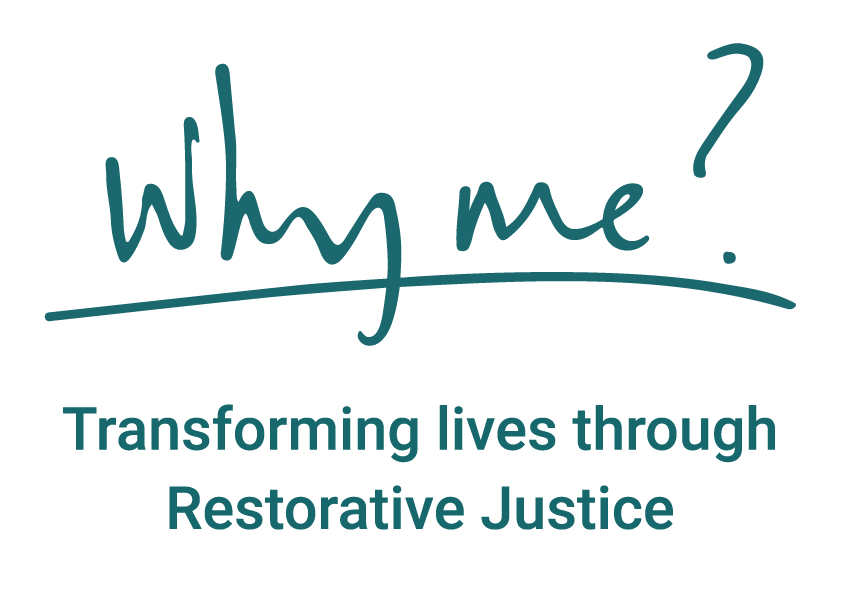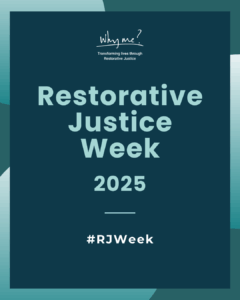Repairing harm through the principles of Restorative Justice
This is a blog written for other organisations to reproduce this Restorative Justice Week. If you would like to share this blog with your audience, you are welcome to. Please let us know if you share it via info@why-me.org and credit Why me?.
This is a blog by Why me?’s Communications and Campaigns Manager, Keeva Baxter. Why me? are a national charity campaigning for awareness of and access to Restorative Justice.
We all want to see a world where people affected by crime get the support they need to recover.
But at the moment, many are left with unanswered questions, never getting the chance to have their say.
By giving people harmed by crime or conflict the chance to have a dialogue with the person who harmed them, they can get their voice heard, and get the answers they need to move forward. This can be done through a process called Restorative Justice.
This week (16th-22nd of November) is Restorative Justice Week 2025, a time to raise awareness of the power of Restorative Justice, spread the word about its benefits and highlight the experiences of people who have been through it. It is an opportunity to ensure that people affected by crime or conflict know about their right to information about Restorative Justice and a referral to a service, under the Victims Code.
What is Restorative Justice?
Restorative Justice is a carefully managed process that brings together someone harmed by a crime with someone that harmed them. This can be done directly, through a face to face meeting or indirectly through letters or a shuttle process.
The process is supported by trained facilitators at all times, who meet with each party multiple times in preparation, to discuss what they want out of the process and how their needs could be met. The role of the facilitators is also to assess risk, and ensure that the process is safe to go ahead.
What are the key principles of Restorative Justice?
The restorative process is based on six key principles, outlined by the Restorative Justice Council. Below, we explore each principle and what that looks like when working restoratively.
- Restoration
The restorative process aims to repair some of the harm that has been caused to the people involved. It does not expect to return people to exactly the way they were before, but to enable them to make a positive shift. It is crucial that the intervention does not cause any further harm to any of the people involved.
- Voluntarism
It is essential that participation in a restorative process is completely voluntary for everyone involved, meaning that they actively want to participate. Someone feeling obliged to take part would damage the integrity of the process, making it higher risk and more likely that participants will not get what they want. This is why no one can be ‘sentenced’ to take part in a restorative process. Instead, they can be referred to a restorative service where they will explore their options and decide whether it is right for them. Another aspect of the ‘voluntarism’ principle is that participants can withdraw from the process at any time, and expectations must be managed to ensure everyone is prepared for this eventuality.
- Impartiality
The principle of impartiality means that Restorative Justice facilitators must acknowledge their own position – their privilege, position of power and the parts of their identity that may affect their practice. On top of this, they must do what they can to avoid these factors affecting the process, being aware of how they present, addressing conflicts of interest and aiming for impartiality.
In previous iterations of the restorative principles, the word neutrality was used instead of impartiality. But this shaft reflects the understanding that no one can be truly neutral, as they are approaching a situation with their own internal biases and life experiences. Instead of being neutral, facilitators should strive to acknowledge where they are coming from, avoid bias and actively work towards impartiality.
- Safety
A trained Restorative Justice facilitator must decide that the process is safe in order for it to go ahead. They speak to each party in advance to assess what risks may arise, and how to manage them. As always, the principle of causing no further harm remains throughout. If there is any indication that the process will not be safe, it will not go ahead at that time.
- Accessibility
The restorative process should be available to everyone affected by crime. While it may not be suitable for everyone, no one should be excluded from taking part because of who they are or the type of crime that they experienced. In order for this to happen, Restorative Justice services should ensure that information is accessible and available in a variety of formats, with consideration for how different communities will access the service.
- Empowerment
The aim of the restorative process is to empower people affected by crime to have a voice, make their own choices and get their needs met in a way that is meaningful for them. The Criminal Justice System and court process can be disempowering and can leave people feeling unheard and retraumatised. In contrast, Restorative Justice aims to give agency back to the participants. This sense of empowerment can be built through informed consent, managed expectations, keeping people informed and moulding the process around the needs of the people involved.
Whilst Restorative Justice often addresses harm caused by crime, the approach and the ideology behind it can be expanded far beyond the Criminal Justice System. This Restorative Justice Week, consider how the principles of Restorative Justice could be embedded into your work, and how using dialogue to address harm could begin to repair harm, rebuild relationships and empower people to have a voice.
To find out more about Restorative Justice, visit the Why me? website and subscribe to our newsletter.
If you believe that victims of crime should have the right to be heard through a legal right to Restorative Justice, join our campaign.

